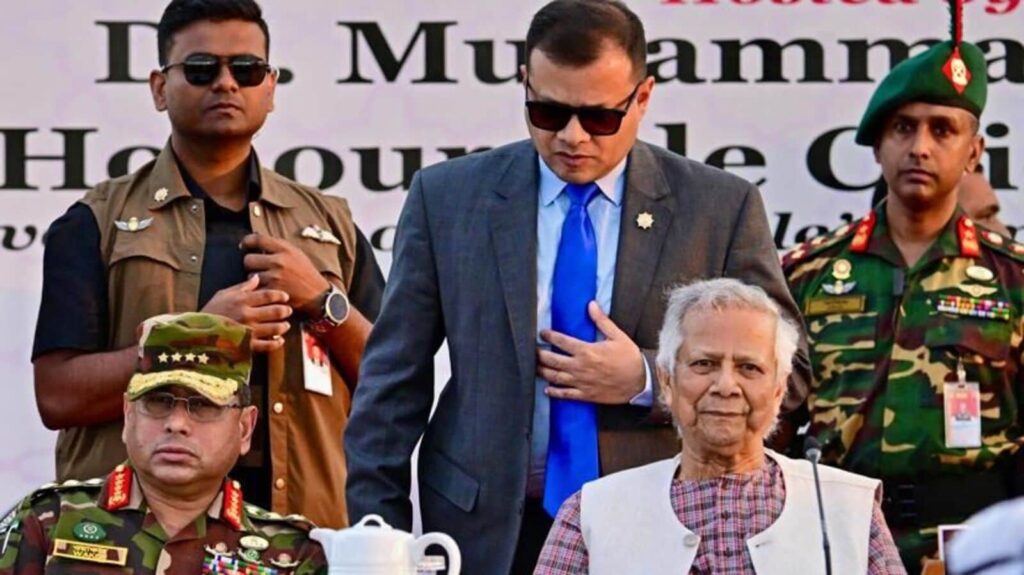Bangladesh’s interim leader, Muhammad Yunus, has reportedly said he is “thinking of” stepping down from the post, almost a year after taking over the office following a mass agitation that ousted the then-Prime Minister Sheikh Hasina.
Amid the rumours surrounding Yunus’ resignation, a top student leader said on Thursday that Bangladesh’s de facto prime minister has expressed concerns over the political parties not reaching a “common ground”.
Challenges before Muhammad Yunus
Since becoming Bangladesh’s chief advisor, Yunus’s main role is said to be: “Reform the system and prepare for fair elections.”
Yunus had promised major reforms in various sectors. But a lack of progress and growing political disagreement have put his administration in a tight spot.
Bangladesh’s political crisis escalated this week, with rival parties protesting on the streets of the capital Dhaka with a string of competing demands.
Several reports on Friday quoted National Citizen Party (NCP) leader Nahid Islam as saying that Yunus was finding it difficult to work without the backing of political parties.
After meeting Yunus on Thursday, Nahid Islam told BBC Bangla, “He [Yunus] said if he cannot do the work he was asked to do – reform the system and prepare for fair elections – then he may have to leave.”
“He feels trapped between demands from different political camps and growing public impatience,” Islam was quoted by Reuters as saying on Thursday.
According to local reports, Yunus expressed “frustration and anger” over the current state of affairs in Bangladesh, questioning the purpose of remaining in office if he cannot perform his duties effectively.
Yunus also expressed discontent about relentless protests over myriad demands. “…the way I am being held hostage by the situation and the protests – I cannot work like this,” Yunus reportedly told Nahid Islam in the “unofficial meeting” held on Thursday.
Key issues Muhammad Yunus’ admn is facing
1. Political protests over Bangladesh elections
The Bangladesh Nationalist Party (BNP), a rival of Sheikh Hasina’s Awami League party and led by former Prime Minister Khaleda Zia has sought nationwide elections by December this year. The party wants Yunus to set an election date.
However, the NCP said the elections must be held only after the completion of reforms.
Thousands of supporters of the powerful BNP rallied in Dhaka recently, holding large-scale protests against the interim government for the first time.
Khaleda Zia threatened to withdraw the BNP’s support from the Yunus-led government in Bangladesh. According to Reuters, the BNP said on Wednesday that it would be “difficult” to continue supporting the interim government without a firm election plan.
Meanwhile, Nahid Islam, the head of the newly-formed NCP, said, “Elections without reform will only take us back to the same problems.”
Yunus said the elections could be delayed until 2026.
However, according to Dhaka Tribune, Yunus raised doubts about conducting a free and fair election under the current circumstances.
He reportedly questioned whether law enforcement agencies would be able to prevent incidents “like ballot snatching if the election were held in this situation.” As per sources, he said that if the election went poorly, people would hold him responsible.
The BNP also demanded a smaller advisory council, with immediate removal of Mahfuj, Asif and National Security Adviser Khalilur Rahman.
2. No consensus on Election Commission, Cabinet
Leaders of the National Citizen Party (NCP) demonstrated on Wednesday, saying they would not take part in any elections under the current Election Commission. They protested outside the Election Commission, alleging it had been taken over by the BNP.
They accused Bangladesh’s Election Commission of bias and termed it a “party office” of the BNP. According to Daily Star, the NCP leaders demanded the reconstitution of the Election Commission.
The NCP leaders also demanded the resignation of Finance Adviser Salehuddin Ahmed, Law Adviser Asif Nazrul, and Planning Adviser Wahiduddin Mahmud.
The BNP also demanded that Yunus sack two members of this cabinet, accusing them of being close to the NCP, as well as the national security advisor.
According to local media, the party demanded a smaller advisory council, with immediate removal of Mahfuj, Asif and National Security Adviser Khalilur Rahman.
3. Yunus’ ‘deteriorated’ties with Bangladesh military
Yunus’ relationship with the military has also reportedly deteriorated.
Adding to the pressure, Bangladesh’s army chief, General Waker-Uz-Zaman, also called for elections in December in a speech at Dhaka cantonment this week.
He had expressed his dissatisfaction over the political situation.
“Bangladesh needs political stability. This is only possible through an elected government, not by unelected decision-makers,” one source quoted the army chief as saying in an officers’ address.
“Bangladesh is passing through a chaotic phase,” Waker-Uz-Zaman was quoted by newspapers as saying. “The situation is worsening by the day. The structure of the civil administration and law enforcement agencies has collapsed and failed to reconstitute,” he said.
4. No consensus on ‘humanitarian corridor’
The initiative to establish a so-called “humanitarian corridor ” is said to be a major point of contention between Yunus-led advisers and the military establishment.
The corridor connects Chittagong with Myanmar’s Rakhine province.
The Hindu learnt that the idea of the corridor was “unequivocally” rejected by General Waker Uz Zaman in Wednesday’s meeting. He reportedly described it as “completely unacceptable” because of the security risks involved.
As per the report, the Yunus administration argues that the “humanitarian corridor” will provide medicines and other necessary items for the conflict-torn Rakhine — which is known as the centre of the Rohingya crisis.
“It has also been suggested that the corridor will turn into a security threat as it is difficult to ensure proper management of such an initiative…,” the report added.
NCP secretary Akhter Hossain said recently that the government must hold discussions with the political parties before finalising any decision on the proposed humanitarian channel to send aid to Myanmar’s Rakhine.

